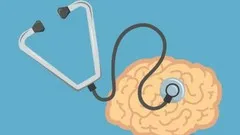
The Neuroscience of Reframing & How to Do It 
Neuroscience research has revealed the power of reframing, a cognitive technique that can help to shift perspectives and create new possibilities. This article explores the science behind reframing and provides practical tips for how to use it. ▼
ADVERTISEMENT
Course Feature
![]() Cost:
Cost:
Free
![]() Provider:
Provider:
Udemy
![]() Certificate:
Certificate:
No Information
![]() Language:
Language:
English
![]() Start Date:
Start Date:
On-Demand
Course Overview
❗The content presented here is sourced directly from Udemy platform. For comprehensive course details, including enrollment information, simply click on the 'Go to class' link on our website.
Updated in [March 06th, 2023]
This course, The Neuroscience of Reframing & How to Do It, provides an overview of the science behind reframing and how to apply it in everyday life. Participants will learn how to grow a flexible mindset and view occurrences and situations from constructive angles. Through this course, participants will gain insight into the inner and outer effects of reframing and how to do it. Examples and questions will be tailored to professionals, managers and executives, but anyone is welcome to join. Participants are encouraged to share their most powerful reframings with the group or by contacting the instructor. Recommended reading is "Play Your Brain" by Anette Prehn and Kjeld Fredens. With more than 800 course participants and an impressive 4.5 out of 5 stars, this course is sure to provide a valuable learning experience.
[Applications]
The application of this course is suggested to be used by professionals, managers and executives to grow a flexible mindset and view occurrences and situations from constructive angles. It is also recommended to read "Play Your Brain" by Anette Prehn and Kjeld Fredens (Marshall Cavendish, 2011 - translated into both Complex Chinese and Russian) to further understand the concept of reframing. Participants are also encouraged to share their most powerful reframings either as a comment to the group or by contacting Anette Prehn at [email protected]
[Career Paths]
Recommended career paths for learners of this course include:
1. Cognitive Behavioral Therapist: Cognitive Behavioral Therapists help individuals identify and reframe negative thought patterns and behaviors in order to improve mental health. This career path is growing in demand as more people seek out mental health services.
2. Executive Coach: Executive Coaches help executives and other professionals identify and reframe their thought patterns and behaviors in order to improve their performance and productivity. This career path is becoming increasingly popular as more organizations recognize the value of investing in their employees.
3. Life Coach: Life Coaches help individuals identify and reframe their thought patterns and behaviors in order to improve their overall quality of life. This career path is growing in popularity as more people seek out guidance and support in achieving their goals.
4. Neuroscientist: Neuroscientists study the brain and its functions, including the effects of reframing on the brain. This career path is becoming increasingly important as more research is conducted on the effects of reframing on the brain and its functions.
[Education Paths]
Recommended degree paths:
1. Neuroscience: Neuroscience is a field of study that focuses on the structure and function of the nervous system. It is a rapidly growing field, with new discoveries being made every day. It is an interdisciplinary field, combining elements of biology, psychology, chemistry, and physics. With a degree in neuroscience, you can pursue a career in research, teaching, or clinical practice.
2. Cognitive Science: Cognitive science is an interdisciplinary field that studies the mind and its processes. It combines elements of psychology, neuroscience, linguistics, philosophy, and computer science. With a degree in cognitive science, you can pursue a career in research, teaching, or clinical practice.
3. Psychology: Psychology is the scientific study of the mind and behavior. It is a broad field, encompassing many different areas of study. With a degree in psychology, you can pursue a career in research, teaching, or clinical practice.
4. Computer Science: Computer science is the study of computers and their applications. It is a rapidly growing field, with new technologies being developed every day. With a degree in computer science, you can pursue a career in research, software development, or data analysis.
Developing trends:
1. Neuroscience: Neuroscience is a rapidly growing field, with new discoveries being made every day. Advances in technology have enabled researchers to study the brain in unprecedented detail, leading to a better understanding of how the brain works and how it can be manipulated.
2. Cognitive Science: Cognitive science is an interdisciplinary field that is constantly evolving. Advances in technology have enabled researchers to study the mind in unprecedented detail, leading to a better understanding of how the mind works and how it can be manipulated.
3. Psychology: Psychology is a rapidly growing field, with new discoveries being made every day. Advances in technology have enabled researchers to study the mind in unprecedented detail, leading to a better understanding of how the mind works and how it can be manipulated.
4. Computer Science: Computer science is a rapidly growing field, with new technologies being developed every day. Advances in technology have enabled researchers to create powerful algorithms and software that can be used to solve complex problems.
Pros & Cons

Useful reframing methods and helped reframe annoying situations

Pleasent and enthusiastic presenter

Simplicity, courage and attractiveness of presentation

Interesting, engaging, and actionable information

Gained new perspective on reality

None mentioned
Course Provider

Provider Udemy's Stats at AZClass
Discussion and Reviews
0.0 (Based on 0 reviews)
Explore Similar Online Courses

Creative Writing - Writers Block Workbook Volume 1 Month 1

Solidworks Practice with me Beginners

Python for Informatics: Exploring Information

Social Network Analysis

Introduction to Systematic Review and Meta-Analysis

The Analytics Edge

DCO042 - Python For Informatics

Causal Diagrams: Draw Your Assumptions Before Your Conclusions

Whole genome sequencing of bacterial genomes - tools and applications

Control Your Subconscious Mind: Neuroscience Hidden Secrets

Perform an Excellent Neurological Bedside Exam


Start your review of The Neuroscience of Reframing & How to Do It